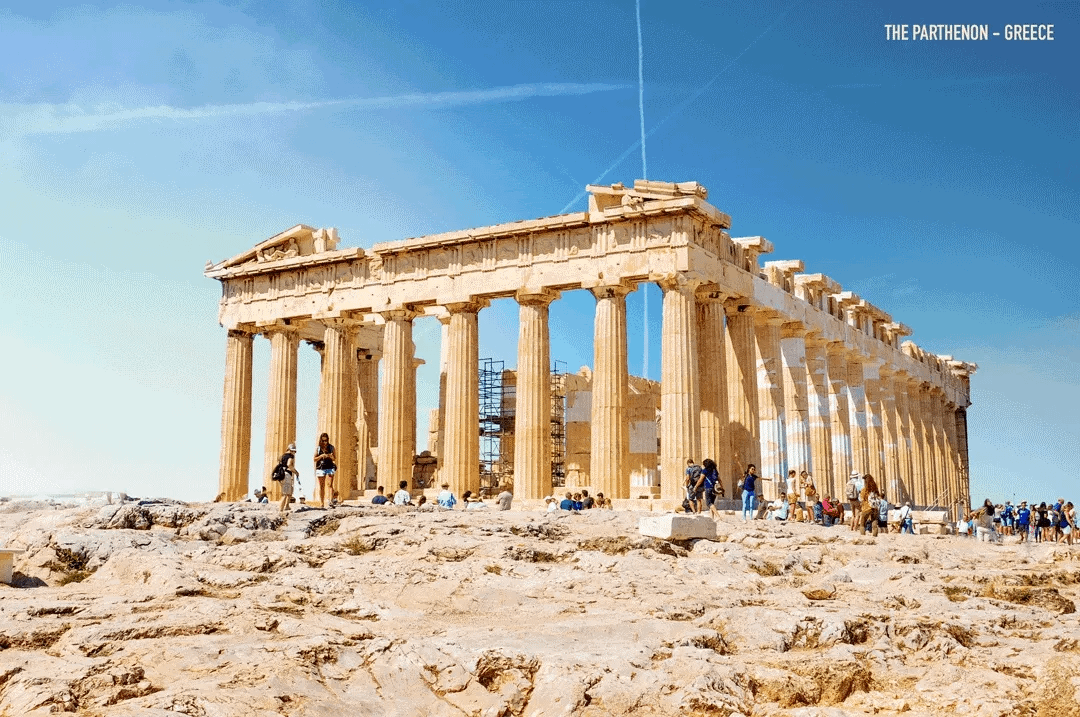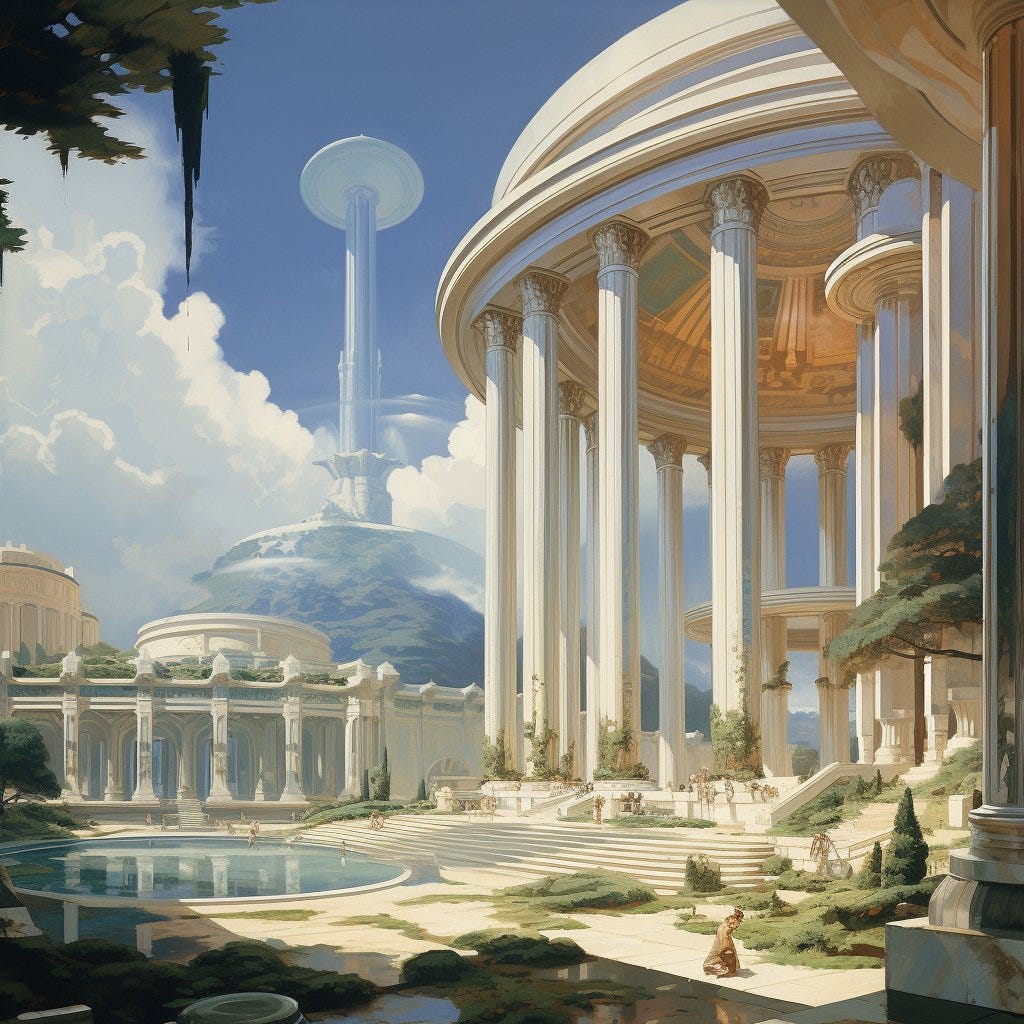Why Greece?
What the West owes to Athens
Dear readers,
I'd like to tell you about a book that has played a major role in my understanding of the importance of Greek heritage in Western civilization. Why Greece? (in French: Pourquoi la Grèce ?) was written in 1992 by Jacqueline de Romilly, an internationally renowned French academic who devoted her career to the study of ancient Greek civilization. She was a member of the Académie française and the first woman professor at the Collège de France. When she was a teenager, her mother gave her a book by Thucydides, one of the first Athenian historians and author of the famous History of the Peloponnesian War in the 5th century BC. She then became passionate about ancient Greek works and thought until she died in 2010. She was convinced that everyone should benefit from the "profound sense of the beauty of the world and the wonder of life" that she felt when reading Homer. Her work earned her the admiration of contemporary Greeks, who awarded her honorary Greek nationality in 1995. For those who are more curious, I can only recommend this documentary (in French with English subtitles) retracing her life.
In Why Greece? Jacqueline de Romilly answers this question: why do the texts of ancient Greece, from Homer to Plato, still speak to us and continue to influence the whole of European culture? For Jacqueline Romilly, it is "their exceptional effort towards the human and the universal" that has enabled these texts to survive the centuries and continue to move us. In so doing, she teaches us that the West owes two fundamental things to ancient Greece, and in particular to the Athens of the 5th century BC:
The invention of freedom
A taste for the universal
1. The invention of freedom
"The idea of freedom was born in Greece, where it was discovered and proclaimed with force, for the first time and in a lasting way"1
Consensual obedience to a law decided collectively and no longer to the will of a single man - that was the Greek innovation. The Greeks became aware of their specificity in the 5th century BC, during the wars which opposed them to the Persian Empire: they noticed that the Persians "obeyed an absolute sovereign, who was their master, whom they feared and before whom they bowed down", behavior that was hardly conceivable for them. The Persians were surprised by the Greeks, who were not fighting for a king, but for the freedom of their city. Jacqueline de Romilly sees here the birth of the Western ideal of defending freedom against absolutism: "Greece, confronting Darius, then Xerxes, thus defined in clear terms our European ideal".
For the Greeks, political freedom was inseparable from freedom of thought and expression. They bequeathed to Westerners the taste and habit of debate. In The Phoenician Women, a tragedy by the Athenian poet Euripides, Jocasta asks her son what is the most difficult thing about being an exile: "The worst of it, mother, is the fact that there is no free speech". And Jocasta agrees: "That’s a slave’s life, you’re describing, not to be able to speak freely".
In his speech Hommage à la Grèce (Homage to Greece), delivered in Athens on 28 May 1959, the French writer André Malraux summed up the revolution represented by the invention of freedom by the Greeks: “It was through the first civilization without a sacred book that the word intelligence came to mean questioning. The questioning that was to lead to the conquest of the cosmos by thought, of destiny by tragedy, of the divine by art and by man (...). Ancient Greece tells you: "I sought truth, and I found justice and freedom. I invented the independence of art and the mind. For the first time, I set man, who had been prostrate everywhere for four millennia, face to face with his gods. And at the same time, I set him up to face the despot.”

2. A taste for the universal
“The Greek heritage, founded on the aspiration to the universal, has become the very spirit of our Western civilisation.”
For Jacqueline de Romilly, Homer's Iliad and Odyssey is an epic that is different in that it is eminently universal. Anger, pity, tenderness or honor: the poet describes human feelings in a simple and timeless way. That's why this text still touches us, almost three millennia after it was written. For the French Academician, the entire human condition is already present in Homer. She gives the example of the scene in which the warrior Hector bids farewell to his wife and son before leaving to fight. At the moment of the difficult parting, the warrior and his wife are amused by the curiosity and fear that the warrior's helmet arouses in their child. To reassure him, his mother takes him in her arms "smiling through her tears", writes the poet. In this scene, which is one of the most moving in The Iliad, Jacqueline de Romilly sees the perfect example of the Greek poet's genius: succeeding in describing in a simple, beautiful and timeless way the complexity of human feelings - in this case, those of a woman torn between fear for her husband going off to war and laughter at her child's curiosity about her husband's helmet. This is undoubtedly why "Homer's heroes became lifelong companions, first in Greece, then in Rome, and now in every European country".
"Humanity is everywhere in this first epic (...) It is in its genius for reducing everything to the human condition and in its refusal to accept any ethnic or particularistic limitations. In this respect, the Iliad in fact inaugurates what will become our culture's desire for universality, and the openness to others that, unlike many civilisations, it places at the top of its list of values" Jacqueline de Romilly in Pourquoi la Grèce (1992)
This taste for the universal is also reflected in the search for general truths and an interest in other cultures. When the Athenian historian Thucydides analysed the reasons for the war between the cities of Athens and Sparta in The Peloponnesian War, he hoped to bequeath to mankind a lesson that would be "a possession for all time". 2,500 years on, he seems to have succeeded: in a recent book2 Harvard professor Graham Allison takes up his teachings to analyse the rivalry between the dominant American power (in the situation of Sparta) and the rising Chinese power (in the situation of Athens). He thus developed the concept of the Thucydides Trap, a situation in which war breaks out when an ascendant power challenges the hegemony of a hitherto dominant power.
Conclusion - My take
In Why Greece? Jacqueline de Romilly reminds us that we owe these two fundamental elements of Western identity: the quest for freedom and a taste for the universal (the latter reinforced by two millennia of Christianity). This practice of individual and collective freedom that characterises the Western peoples of today and is one of the reasons for their prosperity began more than 25 centuries ago in Athens. The Greeks also bequeathed us a taste for the universal, often for the better (openness and curiosity about foreign cultures, the quest for knowledge) and sometimes for the worse (lack of awareness of our own identity, the tendency to assume that the world shares our values). We have recently seen thanks to Japan that this taste for the universal... is not universal at all.
Of course, the Greeks were no angels. Like other peoples of their time, they sometimes broke the law, had slaves and democracy could turn into popular tyranny. But the academician concludes: "Nevertheless, the Greeks were at least able to say what should have been, to define values, and sometimes to die for them".
This quotation comes from La Grèce antique à la découverte de la liberté, a book by Jacqueline de Romilly published in 1989.
Destined for War: Can America and China Escape Thucydides’s Trap? (2019) by Graham Allison







